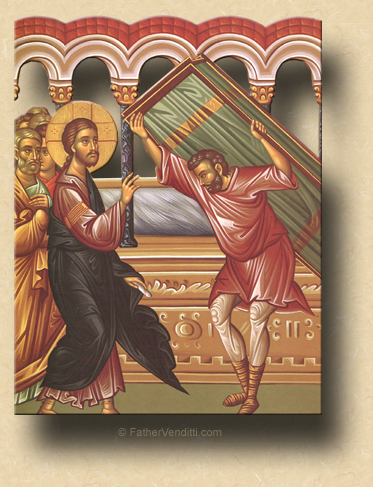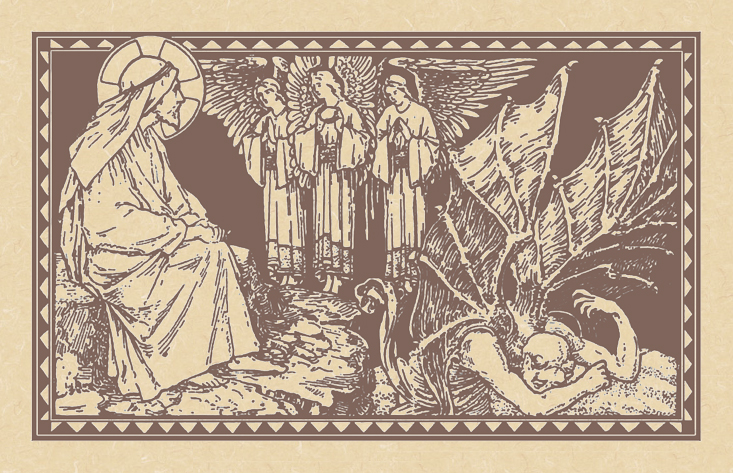The Mathematics of Lent: 40-2=38.
Ember Friday of Lent; and, the Commemoration of Saint Gabriel of the Sorrowful Virgin.*
Lessons from the feria, according to the extraordinary form of the Roman Rite:
• Ezechiel 18: 20-28.
• Psalm 85: 2, 6.
• Psalm 102: 10.
• John 5: 1-15.
The Second Friday of Lent.**
Lessons from the feria, according to the ordinary form of the Roman Rite:
• Ezekiel 18: 21-28.
• Psalm 130: 1-8.
• Matthew 5: 20-26.
The Second Friday of the Great Fast; and, the Feast of Our Venerable Father & Confessor Procopius the Decapolite.
Lessons from the triodion, according to the typicon of the Byzantine-Ruthenian Rite:
[For the Presanctified:]***
• Genesis 5: 1-14.
• Proverbs 6: 3-20.
FatherVenditti.com
|
 10:49 AM 2/27/2015 — The place described in today’s Gospel lesson is unique. If we had to, we could compare it to Lourdes in France, where so many Christians have claimed to be cured at the miraculous stream. It was, in fact, a pool of some sort by one of the gates of Jerusalem. This particular site was excavated not long ago;—less than 75 years ago—and one of the men who first excavated this site was from my home town. He was a Baptist minister, and he brought back with him from this site a stone from the pool of Bethesda which, today, is visible embedded in the plaster over the archway leading into the baptistery of the First Baptist Church of Bethesda, Maryland. Hence, the town’s name. 10:49 AM 2/27/2015 — The place described in today’s Gospel lesson is unique. If we had to, we could compare it to Lourdes in France, where so many Christians have claimed to be cured at the miraculous stream. It was, in fact, a pool of some sort by one of the gates of Jerusalem. This particular site was excavated not long ago;—less than 75 years ago—and one of the men who first excavated this site was from my home town. He was a Baptist minister, and he brought back with him from this site a stone from the pool of Bethesda which, today, is visible embedded in the plaster over the archway leading into the baptistery of the First Baptist Church of Bethesda, Maryland. Hence, the town’s name.
In reality, this place was clearly some kind of hot spring connected naturally to some sort of underground source in such a way that, at regular intervals, the water would bubble and churn. And the pious legend among those who lived thereabouts was that the water was being stirred by an angel; and if someone managed to be the first to descend into the water at the time this was happening, that person would be cured of whatever ailed him. Why you had to be the first no one knows, but apparently it didn't work if you were the second or the third.
So, Jesus goes to this place. We don’t know why, exactly. Maybe it’s simply because he knew there would be a great number of sick people there, and we know how our Lord likes to gravitate toward the needy. And there he encounters this man. He’s very sick indeed, crippled, in fact; so much so that there would seem to be no chance that he could ever be the first to get into the pool at the time the waters were stirred.
Now, this man has been sick a long time: thirty-eight years. St. Augustine, in the beautiful passage presented in today's Matins (Treatise 17 on John), points out the significance of this number, particularly as it pertains to our sojourn through Lent: Moses and Elijah both fasted for forty days, as did our Lord, thus our fast during Lent is also forty days. But, our Lord points out that there are two commandments on which the whole law and prophets depend (Matt. 22: 40); likewise the widow who gave all she had: two small coins (Mark 12: 44); and, the innkeeper who who received two silver pieces for the care and healing of the wounded traveler brought to him by the good Samaritan (Luke 10: 35); and, our Lord's own stopover among the Samaritans for two days to bring them the Word of God (John 4: 40); thus, it is not surprising that, forty, lacking the number that signifies charity—two—results in sickness. Thirty-eight years.
In any case, that’s a long time to be going to this pool and not being able to get into the water. I wonder how many of us would have that kind of perseverance. I venture to say that not too many of us, if we were crippled like this man, and if we thought we could be cured by being the first to be dunked into a pool, would keep trying it every day for thirty-eight years without becoming discouraged and giving up. And perhaps that is the very reason that our Lord singles this man out and helps him: because of his perseverance—because he never gave up.
Of course, our Lord didn’t need the stirring of the waters to cure this man. But what would have happened if the man had allowed himself to become discouraged? He wouldn’t have been at the pool that day; and, consequently, he wouldn’t have met our Lord. Thus, he wouldn’t have been cured. Now, that’s a very simple lesson, but a very important one. How often do we sit in front of the TV with the remote and flip through the channels because everything we see isn’t what we want to see, in spite of the fact that we’ve got 500 channels there? And the more they give us, the more we discover how much more there is that we don’t want to see. Ours is a society which breeds impatience. The more that is provided for us at the touch of a button, the more we want. And we become conditioned to want everything right now, at the touch of a button. Only the more that is provided for us, the more we learn that none of it is really what we want. And then this starts to infect our interior life.
So, we want something from God. Perhaps it’s good health, like the man in the Gospel. Perhaps it’s something for somebody else, like our spouse or our children. But whatever it is, we want it now. We launch our prayers off to heaven as if we’re pushing buttons on a remote control, and then we wait for the channel to change—for the circumstances of our life to improve and for God to give us what we want. Did you ever have that feeling when you’re in front of the TV and you’re pushing the buttons and nothing is happening? And you wonder if the batteries are dead, or if it’s not pointed in the right way. We do this with our prayers. Then we begin to second guess God: “What did I do wrong?” Maybe we didn’t do anything wrong. Maybe we just have no patience.
So, how long is too long to wait for an answer from God? Well, I don’t know. The man at the pool of Bethesda waited for thirty-eight years. And during all that time he never lost faith that, one day, God would deliver him from his illness. If he had lost faith, he would have stopped coming to the pool, and would never have met Jesus. Maybe you’re coming here to Mass day after day, and maybe you’re life is a mess and you want it not to be, and you’re waiting for God to do something to help you. How long must you wait? I don’t know. Maybe thirty-eight years. Maybe thirty-eight hours. Maybe a life time. But I do know that if you give up and go home, it will never happen.

* Cf. the footnote in last Wednesday's post for an explanation of the Ember Days in the extraordinary form.
** The Second Friday of Lent is what the Missal refers to as "Friday of the First Week of Lent." Cf. the note regarding the designation of days during Lent, found here.
*** Cf. the footnote in last Wednesday's post for an explanation of the Presanctfied Liturgy on the Wednesdays and Fridays of the Great Fast.
|

